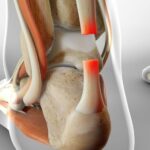The most commonly occurring hormonal condition in females of reproductive age is polycystic ovarian syndrome or PCOS. 8-13% of women, or one in ten, experience it from the start of their periods until menopause. Period issues, difficulty becoming pregnant, acne, excessive hair growth, and obesity can all be symptoms of PCOS. Genetic predisposition is thought of as a pcos reason in women. The good news is that many of these difficulties may be controlled with a healthy lifestyle. Women with PCOS are also more prone to experience several long-term health complications. Here are some of the PCOS-related health issues you need to know.
Weight
Women with PCOS frequently struggle to control their weight. Having more weight can worsen physical symptoms by raising testosterone and insulin levels.
Psychological effects
The psychological changes in women may be related to hormonal impacts caused by PCOS. Depression and anxiety symptoms are more prevalent in women with PCOS.
Fertility
Women with PCOS may have difficulty conceiving naturally due to hormonal imbalances, irregular periods, increased weight, and an unhealthy lifestyle. Although they may require assistance to conceive, women with PCOS have the same number of children as women without the condition. Planning a family before the age of 35 is a good idea if you have PCOS because fertility declines beyond this age, and you will have more time to seek reproductive assistance if you do.
Other health problems linked to PCOS
Pre-diabetes, type 2 diabetes, gestational diabetes, abnormalities of blood lipids and cholesterol, and cardiovascular disease (heart disease, heart attack, stroke) are all illnesses that are more likely to develop as a result of PCOS. A nutritious diet, active lifestyle, and weight loss can all help to lower these risks. Some experts believe an unhealthy lifestyle is a pcos reason.
How is PCOS diagnosed?
PCOS is diagnosed using a combination of physical exams, blood testing, and ultrasounds. Two of the following three criteria must be met in order to diagnose PCOS:
- Irregular periods
More frequently than monthly or no periods at all.
- Androgens
Manifestations including acne and excessive hair growth
Blood has high amounts of androgens. This is called Hyperandrogenism
- Ultrasound
An ultrasound displaying 20 or more eggs on one ovary that resemble dark circles and are half-formed. Ultrasound is not required for all women with PCOS.
Women under the age of 20 should avoid this.
Taking care of and treating PCOS
While PCOS cannot be completely erased, women can keep it in control. The first steps – and best strategies – to reduce PCOS symptoms and maintain long-term health are eating healthily, exercising regularly, and avoiding weight gain.
Ways to manage irregular periods
Hormone-based birth control, such as the pill or mini-pill, can be helpful. Women with PCOS who do not ovulate can be treated with the insulin-sensitizing drug metformin.
Regular menstrual cycles support uterine health for women with PCOS. Your doctor will give progesterone to induce menstruation if you have fewer than four periods annually.
Final thoughts
Controlling anxiety and depression is important when you have PCOS. Talk to your doctor about your mood if you are having fearful or depressing thoughts or have lost interest in your usual activities. When someone asks can pcos be cured, tell them a healthy lifestyle, counseling, psychological support, and medication are the answer. Remember that you are not alone with PCOS, and you have all the necessary help.











